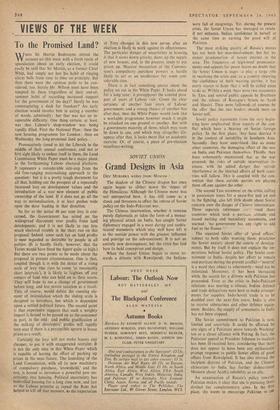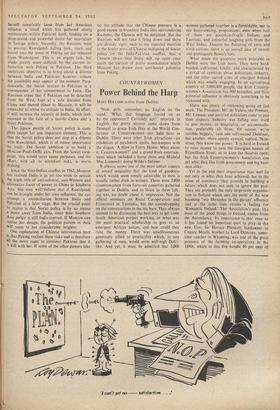SOVIET UNION
Grand Designs in Asia
DEV MURARKA writes from Moscow :
The shadow of the Chinese dragon has once again begun to slither down the slopes of the Himalayas. Although the Chinese move *as - not unexpected here, it has still come as a shock and threatens to affect the cdurse of Soviet policy 'on the Indo-Pakistani war.
The Chinese intervention, whether it remains purely diplomatic or takes the form of a menac- ing physical attack on India, has caught Soviet diplomacy engaged in a most daring and sophis- ticated. mancetwre which' May well have left it as the outside power with the greatest influence and prestige on the 'subcontinent. 'It is not an entirely new development, but the crisis has laid bare its bold conception and design.
When the Soviet Union began to move to- wards a detente with Rawalpindi, the Indians were full of misgivings. Yet, during the present crisis, the Soviet Union has managed to retain.
if not enhance, Indian confidence in herself at the same time as earning the good will of Pakistan..
The most striking quality of Russia's moves has not been her non-involvement, but her in-
sistent, proclamation of Soviet interest in the
area. The frequency ot high-level pronounce- ments and appeals for peace leaves no doubt that the Soviet Union is eager to play a large rOle in resolving the crisis and. as a country enjoying the confidence of both warring parties, it has every reason to hope that it will be called upon
to do so. Within a. week there were two statements by Tass, and several`public appeals by Brezhnev and the release of Kosygin's letters to Ayub and Shastri. They were follov,ed. of course, by the offer that the two leaders should meet on Soviet' soil.
Soviet policy statements from the very begin- ning have emphasised three aspects of the con-
flict which have a bearing on Soviet foreign policy. In the first place. they have decried it in the context of instability in Southern Asia.
Secondly. they have underlined, like so many
other countries, the damaging effect of the war on India and. Pakistan themselves. Thirdly. they have vehemently maintained that as the war
proceeds the risks of outside intervention in- crease, with the added danger that outside interference in the internal affairs of both coun- tries will follow. This- is coupled with the con- tention that these, outside parties are playing them off one against the other.
The second Tass statement on the crisis, calling in passionate tones for a cease-fire and an end to the fighting, also left little doubt about Soviet
concern over the danger of Chinese intervention. Three separate references cot' -nned those countries. which took a• partisan attitude and issued' inciting and -incendiary statements, and warned: 'no government has any right to add fuel to the flames.'';'''
The repeated Soviet Offer of 'good offices,' subject to both sides wanting them, proclaims the Soviet' anxiety •abont the c'tiiirse of develop; ments. But by itself it does not explain the im- peratives behind Soviet policy. The Soviet com-
mitment to India. despite her effort to remain non-partisan during the present conflict—'neutrar is a word they object to vehemently—need not be reiterated. Moreover, it has been increasing while the search for a detente with Pakistan has r proceeded. Even as the crisis in Indo-Pakistan-
relations was nearing a climax, Indian defence and trade delegations, were here to make arrange- ments for supplies.' Indo-Soviet trade is to be donbled over the next five years. India is also to receive submarines and other defence equip- ment. Besides, the supply of armaments to India has not been stopped.
' The Soviet commitment tO Pakistan is new, limited and uncertain. It could be affected by any signs of a' Pakistani move towards Washing- ton or a closer alliance with Peking. In fact, the Pakistani appeal' to President Johnson to mediate has been ill-received here, considering that there does not appear to have been any enthusiastic prompt response to public Soviet offers of good offices from Rawalpindi. It has also revived the incipient distrust of Pakistan, and the Chinese ultimatum to India has further disheartened Moscow about Ayub's reliability as an ally.
An examination of Russia's policy towar(1!; Pakistan makes it clear that she is pursuing three distinct but complementary aims. In the first place, she wants to encourage Pakistan to cut herself completely loose from her American alliance, a trend which has gathered strong momentum within Pakistan itself, feeding on a deep-seated and powerful desire for neutralism in foreign policy. Secondly, the Russians want to prevent Rawalpindi falling lock, stock and barrel into the arms of Peking on the rebound from Washington. This is an urgent task, but made greatly more difficult by the current in- fatuation with Peking in Pakistan. The third ambitious objective is to bring about a détente between India and Pakistan. however remote the possibility may appear at the moment. Para- doxically. the Soviet interest in Pakistan is a consequence of her commitment to India. The . Russians argue that if Pakistan can be detached from the West, kept at a safe distance from China and moved closer to Moscow, it will be amenable to revise its attitude to India. In effect, it will increase the security of India, which feels exposed in the face of a hostile China and 'a bitter Pakistan.
The jigsaw puzzle of Soviet policy is com- plete except for one important element. This is that the Soviet policy does not stop at a detente With Rawalpindi, which is of minor importance by itself. The Soviet ambition is to build a Moscow-Pindi-Delhi axis. From the Soviet view- point, this would serve many purposes, and the effort, with all its attendant risks, is worth making.
Since the Sino-Indian conflict in 1962, Moscow has realised India is as yet too weak to sustain the triple role of anti-colonial, anti-Western and alternative focus of power to China in Southern Asia. She may welltbelieve that if Rawalpindi can be brought under her own influence, she can attempt a reconciliation between India and Pakistan at a later stage. But the' crucial point to realise is that Soviet policy is by no means a move away from India, since their Southern Asia policy is still India-centred. If Moscow can realise her design, the political picture in Asia Will seem to her considerably brighter. • One explanation of Chinese intervention here' IS that Peking realises these risks and is therefore' all the more eager to convince Pakistan that. it is still with her. If some of the other powers take
up the attitude that the Chinese pressure is a good excuse to browbeat India into surrrendering Kashmir, the Chinese will be delighted. But the Russians will not take it lying down and there are already signs. such as the repeated mention in the Soviet press of Chinese maligning of Soviet policy ' on the Endo-Pakistan conflict, that a Chinese thrust into India will rip open once again the curtain of polite nonchalance which Moscow has drawn over anti-Soviet polemics from Peking



































 Previous page
Previous page